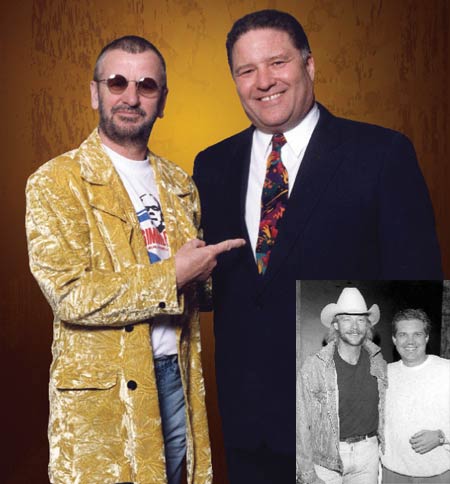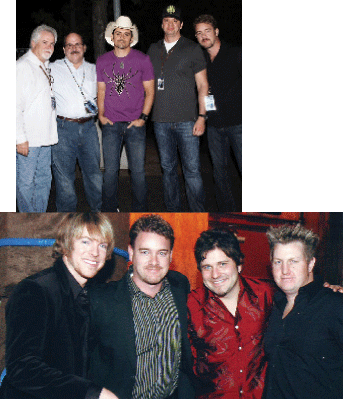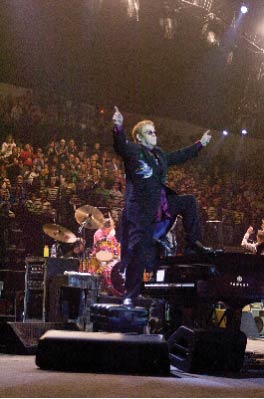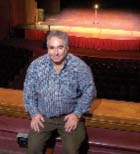'Montana Mafia' makes its mark with big names and bigger plans
By Sherry Jones
WHO’S THE BETTER DRUMMER?
Brian Knaff, president of Talent Buyers Network and a UM alum, stands next to fellow drummer Ringo Starr of The Beatles. The picture was taken during the Ringo Starr and His Allstar Band Tour of ’05 (left). James Yelich, an agent with Paradigm and UM alum, poses to the right of country music superstar Alan Jackson, whom Yelich helped “discover” (right).
Ask James Yelich about being a big shot on the national entertainment scene, and he’ll tell you how 150 superstar agents once gave him a standing ovation for introducing himself as a guy from Red Lodge, Montana.
It’s not the only time being a Montanan has paid off for Yelich, an agent with Paradigm in Nashville, Tenn. While studying at UM in the late 1970s and early ’80s, Yelich helped a roommate promote concerts for Associated Students of UM Programming (now UM Productions). Initially planning to work for the U.S. Forest Service, Yelich found himself dealing with a completely different species of wildlife within a year of graduation.
Merle Haggard. Waylon Jennings. Reba McEntire. Trisha Yearwood. The Bellamy Brothers. Yelich has worked with them and many more since he graduated in 1981.
“I always loved music, and I always had an ear for a great song,” he says. Those traits helped him “discover” country musician Alan Jackson and made him a Haggard fan before he ever worked with the man.
“I have more stories on that guy,” he says of Haggard. “We would laugh every day he was in the office. He was probably the one who entertained me the most. Crazy stuff.”
Just as beneficial to Yelich’s career, however, are fellow UM graduates and members of the so-called “Montana Mafia” Brian Knaff from Glasgow, president of Talent Buyers Network, and Keith Miller from Kalispell, senior vice-president at the William Morris Agency in Nashville.
“We all talk,” Yelich says. “We have a very ethical way of doing business with each other in a very crazy business. All of us that grew up there have that core Montanan through us. We’re very proud of where we’re from.”
“It’s a very close-knit family. I’m proud to say I’m from Montana,” agrees Rob Beckham, an agent for sixteen years with the William Morris Agency in Nashville. “It’s a very cool and very distinguished and very successful group of people.”
Not only has he worked with Yelich in the past, Beckham says, but he now works alongside Miller at William Morris, where he has represented such big names as Clint Black, Rascal Flatts, and Garth Brooks, and for whom he “discovered” country music star Brad Paisley.

Left: Rob Beckham, an agent with the William Morris Agency (far right) stands with associates and country music star Brad Paisley, (center). Below: Rob Beckham (second from left) with (left to right) Joe Don Rooney, Jay DeMarcus, and Gary LeVox of Rascal Flatts.
The job has its perks. “I get to fly in private planes,” he says. “The Grammies were the best time.”
But there’s plenty of fun to go around, and Beckham says he’s more than happy to share. Over the years, he estimates, a half-dozen or so UM grads have landed jobs at William Morris. “I’m happy to help other people,” Beckham says. “Nobody does this by themselves.”
That spirit of altruism was behind the 2001 creation of UM’s Entertainment Management Program, featuring guest instructors from various walks of show business who share revealing tricks of the trade.
“What are we doing this for? For the students,” says Knaff, self-proclaimed “godfather” of the “Montana Mafia” and the brainchild behind the program. As founder and president of the Las Vegas-based Talent Buyers Network, Knaff books shows for casinos, theaters, and other venues. He got his start in Missoula as manager of his own rock band. Then, after graduating from the UM School of Business Administration in 1967, Knaff moved to San Francisco, where he put on concerts in Golden Gate Park and the famous Avalon Ballroom. Since then, he’s worked with the likes of Dolly Parton, Ringo Starr, and Chris Rock, and starmakers such as producer Bill Graham—which is the real thrill for him, he says. As owner of his own company and as an instructor of entertainment management classes, he says he has helped a number of UM grads and undergrads gain purchase in what can be a very slippery industry.
“ASUM pretty much meant everything because it gave me all the skills I needed to do this as a profession,” Beckham says. Funded by students, the organization allowed an autonomy unique on college campuses: ASUM’s members did not have to report to the University administration or a board, but they and their director were entirely self-sufficient.
Knaff, of course, didn’t learn his trade in the classroom. Nor did the other “Montana Mafia” members. “What we had was ASUM (Programming),” he says.
“We had the air space and the latitude to go out and experiment with a lot of different things, big concerts, buying a new sound system,” says Mike “The Goon” McGinley ’75 from Deer Lodge, who has designed financial management systems for a veritable “Who’s Who” in show business, including Sting, Paul McCartney, the Rolling Stones, and Sheryl Crow. “It was a very, very cutting-edge kind of program for a place like UM in the 1970s. So we could experience as students a world most of us would have never had the chance to experience.”

Elton John, who performed in concert at UM‘s Adams Center last September and this April, came to the University through the help of alum Mike “The Goon” McGinley, who serves as a consultant with UM.
ASUM’s learn-by-doing approach not only offered the sweet taste of success to students who put on shows, but it also provided valuable lessons in failure—such as a Smokey Robinson concert in the late 1980s that lost the student organization “tens of thousands of dollars,” says Tom Webster, director of the University Theatre and an instructor in the Entertainment Management Program. He’s also the only “Mafioso” to have remained in Missoula.
“I’m sure I could have gone to a lot of places and done well in the music business,” says Webster, “But I wanted to stay in Missoula—and, by God, I created a career for myself here, and I’ve always been thankful.”
He knows all the others in the group, including Clint Mitchell, a senior vice-president at William Morris who asked that Webster share his story. He and Webster, it turns out, went to high school together, and still play golf whenever Mitchell visits Missoula from his home in Los Angeles. Mitchell represents Bernadette Peters, Riverdance, Rob Becker’s Defending the Caveman, Reefer Madness! and other acts.
Defending the Caveman, Reefer Madness!, Sting, the Rolling Stones, Brad Paisley: If these names sound familiar, perhaps it’s because they’ve all played in Missoula in recent years. That’s no coincidence, Webster says.
“It’s really been a great asset to have all these people (from UM in various sectors of the entertainment industry),” Webster says. “I think our connections in the business really helped us out.”
It certainly helped where the Brad Paisley concert was concerned, Beckham says, “Had I not been from Missoula and asked a favor, that show would probably have never happened.”
The 2006 Rolling Stones concert offers another example of how those UM contacts benefit Montana. Bill Graham Presents—now Live Nation—approached Webster about putting on a Stones concert in Missoula and, although the promoter had worked with UM many times before and “knew we were very competent,” Webster says, its representatives negotiated aggressively from the start.
“Scott Douglas (director of the Entertainment Management Program) said, ‘If you’re over your head, go for the cavalry,’” Webster recalls. So he and UM Productions director Marlene Hendrickson called Mike “The Goon” McGinley.
“The Goon gave us some great advice, and we went from there,” Webster says. He considers the sellout Washington-Grizzly Stadium show one of the high points in his career—and the Stones apparently agree, because “the scuttlebutt was that they thought Missoula was the best date on the tour that they did.”
because it’s a
good place
to play,
and it makes
good economic
sense…”
McGinley shrugs off the notion that he’s doing anything extraordinary by helping to bring his acts to Missoula. UM contracts with McGinley as a consultant to bring concerts like Elton John here.
“They come because it’s a good place to play, and it makes good economic sense,” he says, “or I wouldn’t make the call.”
Call it old-fashioned ethics. Call it the Montana way of doing business. In contrast to its criminal counterpart, the “Montana Mafia” has no hit men, only hit producers. On the other hand, choirboys they’re not—not during their UM years, at least.
“There could still be ‘Wanted’ posters for half of us,” Knaff says with a grin in his voice. “We were wild children then.”

Entertainment Management at UM:
Networking, networking, networking

Above: Tom Webster, the only member of the “Montana Mafia” to stay in Montana, is an entertainment management instructor and director of UM’s University Theatre.
Find an industry you love so much, you’ll think it’s a game!”
So reads a sign in UM’s Gallagher Business Building advertising the Entertainment Management Program, a series of classes designed to help students navigate the mysterious world of celebrity agents, accountants, managers, promoters, and publicists.
“There’s not just the concert industry out there; it’s entertainment industry,” says UM alum Brian Knaff, founder of the program and president of the Talent Buyers Network in Las Vegas, where he finds and schedules entertainment for casinos, theaters, and other venues. “Whether it’s fairs, festivals, special events, hotels, weddings—whatever it is, this is the class you want to have.”
Apparently, a lot of people agree with him, and the number is growing. The program began with a single class in 2001. In the 2008-09 academic year, program director Scott Douglas says, four classes are offered, and, if trends continue, they will all fill up.
“It’s a good problem,” Douglas says. “There are more people that want to come here and share in this experience than we have class time for.”
One of the appeals of the program, Douglas says, is the visiting instructors. UM alumni working on the national entertainment scene regularly appear in the classroom to share what they’ve learned in showbiz. But that’s not all: Douglas, a study in self-confidence, recruits visitors from the highest echelons of the industry. With a sly grin, he tells of calling one of the world’s most famous film directors with an invitation to teach. From the pride lifting his voice, you’d think he was doing the stars a favor, and not the other way around.
“We half-jokingly say that Scott’s out for world dominion,” says Tom Webster, an entertainment management instructor and director of UM’s University Theatre.
“There’s nobody that’s out of the question,” Douglas says. “We have created the reputation and the brand that allows us to reach out to anybody in the entire world.”
As long as they fit the budget, that is: expenses covered, but zero pay. Although housed in the business school, the Entertainment Management Program strives for self-sufficiency, funding itself via concerts and other events that students plan and produce.
“This is the most in-demand class at the University right now, by far,” Knaff says. One reason, instructors say: The subject matter is so compelling, it hardly feels like learning at all.
“The really fantastic thing about this whole course is, we’re doing it with students where they relate and want to learn,” Knaff says. “We’re speaking the language of the entertainment business, which is what they’re most interested in.”
And the entertainment industry is speaking back—with kudos. Pollstar Magazine, which Webster called “the Bible of the touring industry,” lauded UM’s program as “the place to be.” The publicity has done wonders for the program. Recently, Douglas says, the CEO of Sony Entertainment called to ask if there was any room in the teaching schedule for him.
The program gives students a chance to meet and mingle with established professionals in the entertainment business. Jeff Ament of the rock band Pearl Jam has taught; so has Huey Lewis; Rock Scully, former manager for the Grateful Dead; and Stuart Evey, founder of ESPN. In 2007-08 alone, seventy-five visiting instructors spoke to entertainment management classes, Douglas says.
All those names make for quite a Rolodex. And contacts can be invaluable for students serious about landing a job in show business.
“It’s networking,” says James Yelich, a UM alumnus, guest instructor, and talent agent. “The students learn a lot about what they think they would be interested in, but it’s all about meeting us, and us helping them to get jobs.”
 Former Missoulian reporter Sherry Jones is an author and freelance journalist living in Spokane, Wash. Her first novel, The Jewel of Medina, about the youngest wife of the Prophet Muhammad, is scheduled for publication in spring/summer 2009.
Former Missoulian reporter Sherry Jones is an author and freelance journalist living in Spokane, Wash. Her first novel, The Jewel of Medina, about the youngest wife of the Prophet Muhammad, is scheduled for publication in spring/summer 2009.